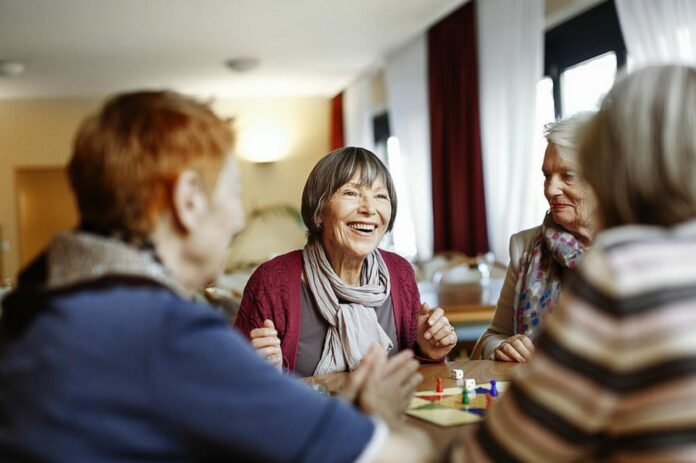Here’s how to slow the aging process…
Although ageing may appear to be an inescapable aspect of existence, researchers are now closer than ever before to discovering medications and interventions that can combat the damaging effects of time.
It is possible that in a matter of years, medications that increase both lifespan and health span by a significant number of years will be accessible.
However, in the meantime, what steps should we take to slow the aging process?
A study of over 28,000 Chinese adults published online in the Journal of Epidemiology & Community Health reveals that regular socialization may help elderly people live longer lives.
According to the research, socializing almost daily seems to be best for a long life.
In 2017, there were 962 million people over 60 around the world, and by 2050, that number is expected to double. As a result, the idea of “active” or “successful” ageing has received a lot of attention; the researchers observe that an active social life seems to be one of its key components.
Yet, the majority of the evidence regarding socializing’s health advantages is centered on individuals in Western nations, with little published data on those in Asia.
To fill up this information vacuum, the researchers looked at a large cohort of elderly adults living in China to see whether socialization was associated with overall survival.
They used data from the Chinese Longitudinal Healthy Longevity Study (CLHLS), an ongoing, prospective nationally representative survey of independent older persons that started in 1998.
Data on the frequency of socializing was first gathered in 2002, and the present research focuses on 5 consecutive waves of data collection from 2002 to 2018-19, encompassing a total of 28,563 individuals with an average age of 89.
The study collected data on the frequency of social activities of the participants, categorized as almost every day, at least once a week, at least once a month, occasionally, or never. Other relevant information such as gender, education, marital status, household income, fruit and vegetable consumption, lifestyle, and poor health was also recorded. The participants’ survival was monitored for an average of five years or until their demise.
Throughout the first five years, 25,406 respondents reported never participating in any kind of social activity, whereas 1,379 stated they did so sometimes, 693 at least once a month, 553 once a week, and 532 virtually daily.
There were 21,161 deaths among participants for the whole of the monitoring period, with 15,728 of them occurring within the first five years.
Overall, people who spent a lot of time with other people lived a lot longer. The probability of surviving longer increases with frequency.
Up to five years after the monitoring period began, standardized death rates were 18.4 per 100 people for those who never socialized, 8.8 for those who did so occasionally, 8.3 for those who did it at least monthly, 7.5 for those who did it at least once a week, and 7.3 for those who did it almost daily.
In comparison to those who reported no social activity, individuals who socialized occasionally experienced a 42% delay in their time to death, while those who engaged in social activities at least monthly, weekly, or nearly every day experienced even greater delays of 48%, 110%, and 87%, respectively.
At the end of the five-year monitoring period, 8420 individuals who reported never socializing survived, while 688 who socialized occasionally, 350 who did so at least monthly, 295 who did so at least weekly, and 272 who did so nearly every day also survived.
Standardized death rates were: 6.2 per 100 people who never socialized, 4.8 per 100 people who socialized sometimes, 5 per 100 people who socialized at least once a month, 5.4 per 100 people who socialized at least once a week, and 3.6 per 100 people who socialized almost every day.
The data indicated the presence of a threshold effect, as only those who socialized nearly every day experienced a statistically significant increase in their survival time, which was delayed by 204% in this group.
Male sex, being younger, having a higher level of education, being married, living in a town/city and/or with relatives, and having good health were all linked to being more socially active.
According to the researchers, social activity appeared to be even more strongly associated with longer survival within the first five years for the oldest old when the data were further stratified by age. This finding suggests that strategies to support the maintenance of active social life in very old people should be encouraged.
As this is observational research, causality cannot be determined. The researchers also admit that they were unable to account for any changes in health or social behaviors over time.
Moreover, the mechanism by which maintaining social ties in old life might improve health is unclear. Enhancing healthy behaviors, such as increasing physical activity and eating healthier, is one of the suggested causes. According to experts, socializing may also lessen the effects of long-term pressures.
The researchers conclude that while the association between social activity frequency and overall survival weakened after accounting for sociodemographic factors, socioeconomic status, healthy behaviors, and various health conditions, it still demonstrated a significant statistical correlation. Therefore, they suggest that participating in social activities is an independent predictor for overall survival in older adults.
Source:10.1136/jech-2022-219791
Image Credit: Getty
